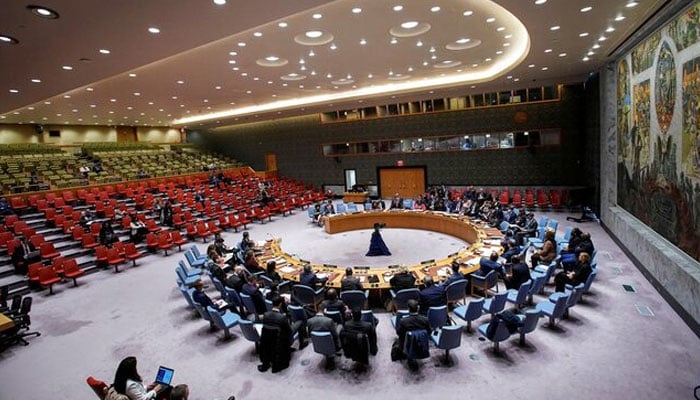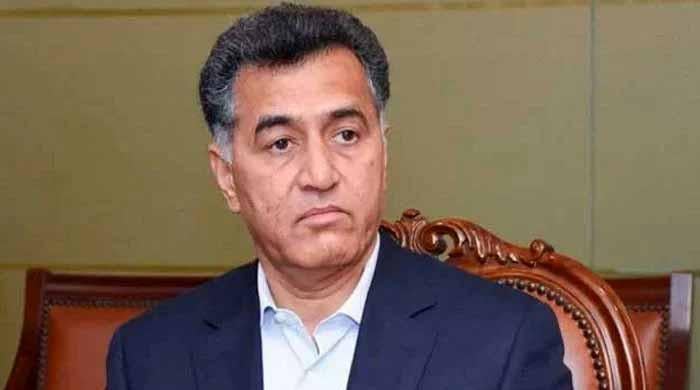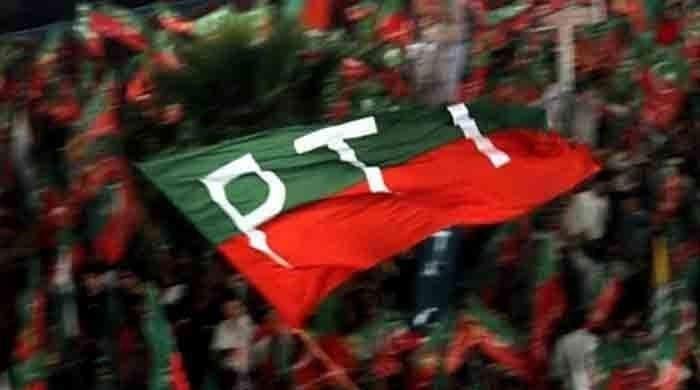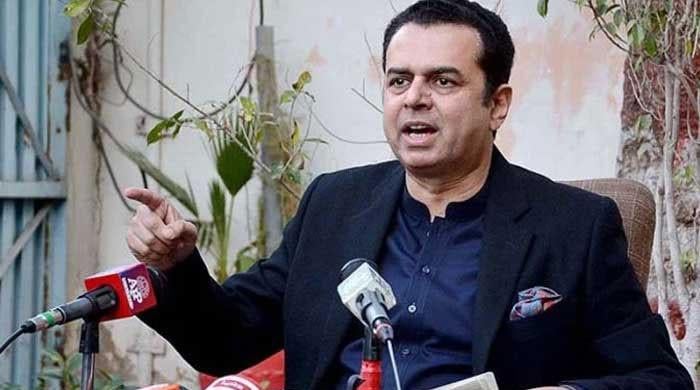Pakistan begins two-year term as non-permanent member of UNSC
Pakistan's Alternate Permanent Representative to UN stresses clear stance on Kashmir, Afghanistan
January 03, 2025

- Envoy says security situation significantly improved in Pakistan.
- Stresses govt's commitment to economic progress and stability.
- Reiterates Pakistan seeks stable Afghanistan for regional peace.
UNITED NATIONS: Pakistan's Alternate Permanent Representative to the United Nations Asim Iftikhar Ahmad has reiterated that the country's stance on Kashmir is rooted in UN resolutions and highlighted the nation's commitment to a peaceful and stable Afghanistan, which he believes is crucial for regional peace.
Earlier today, envoy Iftikhar installed the national flag in front of the UN Security Council chamber on Thursday, as Pakistan began its eighth term for two years (2025-26) as a non-permanent member of the 15-member body.
As part of the joining ceremony, flags of the five new incoming non-permanent members — Pakistan, along with Denmark, Greece, Panama and Somalia — were installed at the UNSC's stakeout at UN Headquarters in New York.
The new members replaced Japan, Ecuador, Malta, Mozambique and Switzerland whose terms ended on December 31, 2024.
In his brief remarks, he said that Pakistan will continue to be guided by the purposes and principles of the UN Charter including maintenance of international peace and security and the development of friendly relations among nations based on the principle of equal rights and self-determination.
“Pakistan will always remain a strong voice for peoples under foreign occupation and oppression and for the realisation of their right to self-determination,” Ambassador Ahmad said.
Pakistan, he said, was convinced that cooperative multilateralism – with the UN at its core – was the best way of tackling today’s multifaceted challenges.
“We need to earnestly address the root causes of long-standing and new conflicts, prioritise dialogue and diplomacy, and support confidence building at regional and global levels – to reduce tensions, arrest the arms race, and enable an environment conducive to peace, stability and development,” the Pakistani envoy said.
Pakistan, he said, will partner with fellow members to actively pursue just and peaceful solutions to the issues on the Council’s agenda, and strive to make optimal use of the tools at our disposal – from conflict prevention to peacekeeping to peacebuilding – to achieve durable peace.
“Our success lies in upholding the UN Charter and international law under all circumstances, and in ensuring the effective implementation of the Security Council’s own decisions,” Ambassador Ahmad said.
“Never forgetting our solemn duty towards the millions of men, women and children suffering in conflicts, Pakistan is assuming this responsibility, fully resolved to our collective endeavour for a more peaceful and secure world.”
Pakistan will preside over the 15-member Council in July when it assumes its presidency according to the alphabetical rotation of the member states’ official names. This will allow Islamabad to set the Security Council’s agenda.
In addition to this, Pakistan will get a seat on the Islamic State (ISIS) and Al Qaeda Sanctions Committee, which is responsible for designating individuals and groups as terrorists and imposing sanctions.
The Security Council has 15 members, five of which – Britain, China, France, Russia, and the United States – are permanent ones. The 10 non-permanent seats of the Council are allocated by geographic region, with five replaced each year.
The Security Council is considered to be the most powerful body of the United Nations. The council, which is tasked to maintain international peace and security, can make legally binding decisions and has the power to impose sanctions and authorise the use of force against states.
The tradition of the flag installation ceremony was introduced by Kazakhstan in 2018.
Kazakhstan’s permanent representative, Kairat Umarov, who presided over the ceremony, voiced confidence that the five new council members will bring much depth and focus to the pressing issues of global peace and security.
“As we begin a new year, it is clear that the global situation continues to be marked by numerous challenges and crisis, from ongoing conflicts and humanitarian calamities to the negative impacts of climate change and the pandemic.”
Speaking to Geo News later, Iftikhar said: "The overall security situation in Pakistan has significantly improved."
He also highlighted the country's positive economic indicators, underscoring the incumbent government’s commitment to progress and stability.
"We have undertaken substantial efforts to combat terrorism," he noted, acknowledging that the menace of terrorism has resurged in the country recently.
Addressing the Afghanistan issue, the envoy affirmed that the issue remains a key item on the UN Security Council’s permanent agenda. "We continue discussions on Afghanistan at the multilateral and bilateral levels," he remarked, adding, "Our position is crystal clear—we want a peaceful and stable Afghanistan, as regional peace is directly tied to stability there."
He highlighted that Pakistan is a strong country, and our nation stands united, expressing confidence that the government and people remain steadfast in their mission to eliminate terrorism.
Reflecting on his role at the UN, he remarked, "It is a great honour to represent Pakistan, and our experienced team will meet the expectations of the government and the nation."
Additional inputs by APP.









